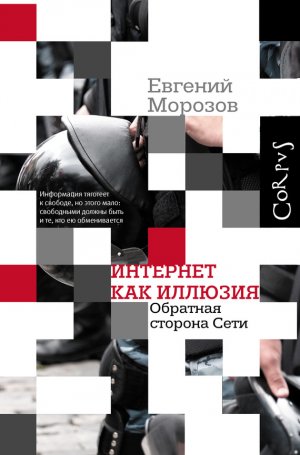Интернет как иллюзия. Обратная сторона сети Морозов Евгений

Fox, J. The Uncertain Relationship Between Transparency and Account-ability // Development in Practice 17, no. 4 (2007): 663–671.
Franzese, P. W. Sovereignty in Cyberspace: Can It Exist? // Air Force Law Review 64 (2009): 1.
Fuchs, C. Some Reflections on Manuel Castells’ Book “Communication Power” // Triple C: Cognition, Communication, Co-operation 7, no. 1 (2009): 94.
Garnham, N. The Mass Media, Cultural Identity, and the Public
Sphere in the Modern World // Public Culture 5, no. 2 (1993): 251. Gilboa, E. The CNN Effect: The Search for a Communication Theory of International Relations // Political Communication 22, no. 1 (2005): 27–44.
Gilboa, E. Global Communication and Foreign Policy // Journal of Communication 52, no. 4 (2002): 731–748.
Glassman, James K., and Michael Doran How to Help
Iran’s Green Revolution // Wall Street Journal, January 21, 2010. Glenny, Misha BlackBerry is but a Skirmish in the Battle for the
Web // Financial Times, August 6, 2010.
Goldsmith, J. L., and T. Wu Digital Borders // Legal Affairs (2006): 40.
Goldsmith, J. L., and T. Wu Who Controls the Internet: Illu-sions of a Borderless World. New York: Oxford University Press, 2006.
Gunaratne, S. A. De-Westernizing Communication/Social Science Research: Opportunities and Limitations // Media, Culture & Soci-ety 32, no. 3 (2010): 473.
Guynn, J. Twitter Hires Obama Administration’s Katie Stanton // Los Angeles Times, July 10, 2010.
Hardy, M. In-Q-Tel, Google Invest in Recorded Future // Government Computer News, July 29, 2010. gcn.com/articles/2010/ 07/29/inqtel-google-fund-web-analysis-firm.aspx.
Hawkins, V. The Other Side of the CNN Factor: The Media and Con-flict // Journalism Studies 3, no. 2 (2002): 225–240.
Himma, K. E. Hacking as Politically Motivated Digital Civil Disobedience: Is Hacktivism Morally Justified? // Internet Security: Hacking, Counterhacking, and Society (2007): 73.
Hindman, M. The Myth of Digital Democracy. Princeton, NJ: Princeton University Press, 2009.
Hofmann, J. The Libertarian Origins of Cybercrime: Unintended Side-Effects of a Political Utopia // ESRC Research Centre Discus-sion Paper no. 62, 2010. w.lse.ac.uk/collections/CARR/pdf/DPs/ Disspaper62.pdf.
Holmes, A. Defining Transparency // Nextgov, September 3, 2009. www.nextgov.com/nextgov/ng_20090903_7217.php.
Holmes, A. The Risks of Open Government // Nextgov, September 14, 2009. www.nextgov.com/nextgov/ng_20090914_3118.php.
Howe, J. P. Obama and Crowdsourcing: A Failed Relationship? // Wired Epicenter Blog, April 1, 2009. www.wired.com/epicenter/ 2009/04/obama-and-crowd/.
Ibahrine, M. Mobile Communication and Sociopolitical Change in the Arab World // Quaderns de la Mediterrnia 11 (2009): 51–60.
Interview with Indira Lakshmanan of Bloomberg TV. U. S. Department of State, March 19, 2010.
Issa, A. Palestine: Twitter Accused of Silencing Gaza Tribute // Global Voices, December 29, 2009. globalvoicesonline.org/2009/12/29/ palestine-twitter-accused-of-silencing-gaza-tribute/.
Jaeger, P. T., Lin, J., Grimes, J. M., and S. N. Simmons Where Is the Cloud? Geography, Economics, Environment, and Jurisdiction in Cloud Computing // First Monday 14, no. 5 (2009).
Jakobsen, P. V. Focus on the CNN Effect Misses the Point: The Real Media Impact on Conflict Management Is Invisible and Indirect // Journal of Peace Research 37, no. 2 (2000): 131.
Jenkins, H. The Chinese Columbine // Technology Review, August 2, 2002. www.technologyreview.com/read_article.aspx?id=12913&ch= infotech.
Johnson, D. G. Is the Global Information Infrastructure a Demo-cratic Technology? // Readings in Cyberethics 18 (2004): 121. Katz, J. E., and C. H. Lai News Blogging in Cross-Cultural Con-texts: A Report on the Struggle for Voice // Knowledge, Technology & Policy 22, no. 2 (2009): 95–107.
Kenner, D. Useless Democracy Promotion Efforts? There’s an App for That // FP Passport, Foreign Policy, December 31, 2009. blog. foreignpolicy.com/posts/2009/12/31/useless_democracy_promotion_efforts_theres_an_app_for_that.
Khouri, R. G. When Arabs Tweet // International Herald Tribune, July 22, 2010.
Kingsbury, P., and J. P. Jones III Walter Benjamin’s Diony-sian Adventures on Google Earth // Geoforum 40, no. 4 (2009): 502–513.
Kirkpatrick, M. Jordan Says It Will Begin Censoring Websites // Read-WriteWeb, January 14, 2010. www.readwriteweb.com/ archives/jordan_to_censor_websites.php.
Klang, M. Civil Disobedience Online // Journal of Information, Communication & Ethics in Society 2, no. 2 (2008): 2.
Kleine D., and T. Unwin Technological Revolution, Evolution and New Dependencies: What’s New About ict4d? // Third World Quarterly 30, no. 5 (2009): 1045–1067.
Kleinz, T., and C. Morris Higher Regional Court Says Online Demonstration Is Not Force // Heise Online, June 2, 2006. www. heise.de/english/newsticker/news/73827.
Kluver, R. US and Chinese Policy Expectations of the Internet // China Information 19, no. 2 (2005): 299.
Kluver, R., and P. H. Cheong Technological Modernization, the Internet, and Religion in Singapore // Journal of Computer-Medi-ated Communication 12, no. 3 (2007): 1122–1142.
Lagerkvist, J. Global Media for Global Citizenship in India and China // Peace Review 21, no. 3 (2009): 367–375.
Land, M. B. Peer Producing Human Rights // Alberta Law Review 46, no. 4 (2009).
Landler, Mark U. S. Hopes Exports Will Help Open Closed Socie-ties // New York Times, March 7, 2010.
Lee, Tae-hoon Lawmaker Calls for Stricter Access to NK Sites // Korea Times, October 6, 2009.
Lessig, L. Against Transparency // New Republic 9 (2010).
Lewis, J. Sovereignty and the Role of Government in Cyberspace //
The Brown Journal of World Affairs 16, no. 2 (2010). Lichtenstein, J. Digital Diplomacy // New York Times Magazine,
July 16, 2010.
Loftus, M. People Use Social Networking to Fight Violence, Extre-mism. U. S. Department of Defense, December 2, 2008.
Lonkila, M., and B. Gladarev Social Networks and Cellphone Use in Russia: Local Consequences of Global Communication Tech-nology // New Media & Society 10, no. 2 (2008): 273.
Luhr, N. L. Iran, Social Media, and US Trade Sanctions: The First Amendment Implications of US Foreign Policy // First Amendment Law Review 8 (2010): 500–533.
Lynch, M. Blogging the New Arab Public // Arab Media & Society 1, no. 1 (2007).
Lynch, M. The Internet Freedom Agenda // Abu Aardvark’s Middle East Blog, January 22, 2010. lynch.foreignpolicy.com/posts/2010/01/ 22/the_internet_freedom_agenda.
MacKinnon, R. China’s Cnsorship 2.0: How companies censor blog-gers // First Monday 14, no. 2–2 (2009).
MacKinnon, R. The Great Chinese Censorship Hoax // RCon-versation, March 14, 2006. rconversation.blogs.com/rconversation/2006/03/the_great_chine.html.
MacKinnon, R. Liberty or Safety? Both – or Neither // IEEE Spec-trum, May 2010. spectrum.ieee.org/telecom/internet/liberty-or-safety-bothor-neither.
Markoff, J. U. S. and Russian Accord on Display at Internet Meeting // New York Times, April 15, 2010.
Marosi, R. UC San Diego Professor Who Studies Disobedience Gains
Followers – and Investigators // Los Angeles Times, May 7, 2010. Martin, K. E. Internet Technologies in China: Insights on the Morally
Important Influence of Managers // Journal of Business Ethics 83, no. 3 (2008): 489–501.
McCarthy, C. Philly Targets Facebook, Twitter After Snowball Fight Turns Ugly // CNET, February 17, 2010. news.cnet.com/8301-13577_3-10455254-36.html.
McConnell, M. Mike McConnell on How to Win the Cyber-War We’re Losing // Washington Post, February 28, 2010.
McMillan, R. Citing Cybercrime, FBI Director Doesn’t Bank On-line // IDG News Service, October 7, 2009.
Mearsheimer, J. J. The Tragedy of Great Power Politics. New York: W. W. Norton, 2003.
Merelman, R. M. Technological Cultures and Liberal Democracy in the United States // Science, Technology & Human Values 25, no. 2 (2000): 167.
Metzl, J. F. Information Intervention: When Switching Channels Isn’t Enough // Foreign Affairs 76, no. 6 (1997): 15–20.
Metzl, J. F. Rwandan Genocide and the International Law of Ra-dio Jamming // American Journal of International Law 91, no. 4 (1997): 628–651.
Miller, J. Soft Power and State – Firm Diplomacy: Congress and IT Corporate Activity in China // International Studies Perspectives 10, no. 3 (2009): 285–302.
Mite, V. Estonia: Attacks Seen as First Case of “Cyberwar” // Radio Free Europe/Radio Liberty, May 30, 2007.
Morozov, E. More on the Unintended Consequences of DDoS Attacks on Pro-Ahmadinejad Web-sites // Net Effect, Foreign Policy, June 18, 2009. neteffect.foreignpolicy.com/posts/2009/06/18/more_on_the_ unintended_consequences_of_ddos_attacks_on_pro_ahmadine-jad_web_sites.
Morozov, E. U. S. Web Firms Practice Self-Censorship // Newsweek International, March 7, 2009.
Moses, A. Facebook Bans Doll Nipples // Sydney Morning Herald, July 5, 2010.
Mynihan, C. Arrest of Queens Man Puts Focus on Texting to Rally Protesters // New York Times, October 9, 2009.
Nakashima, E. Dismantling of Saudi-CIA Web Site Illustrates Need for Clearer Cyberwar Policies // Washington Post, March 19, 2010.
Noam, E. M. An Unfettered Internet? Keep Dreaming // New York Times, July 11, 1997.
Norris, P. A Virtuous Circle? The Impact of Political Communications in Post-Industrial Democracies / In: Papers for the Annual Meeting of the Political Studies Association of the UK, London School of Economics and Political Science. 2000.
Nye, J. S., Jr. Cyber Power. Cambridge, MA: Belfer Center for Science and International Affairs, Harvard University, 2010.
Obama Bemoans “Diversions” of iPod, Xbox Era // Agence France-Presse, May 9, 2010.
Obama Pushes China to Stop Censoring Internet // National Public Ra-dio, November 16, 2010.
Oboler, A. The Rise and Fall of a Facebook Hate Group // First Mon-day 13, no. 11–3 (2008).
O’Reilly, Tim My Contrarian Stance on Facebook and Privacy // O’Reilly Radar, May 21, 2010. radar.oreilly.com/2010/05/my-con-trarian-stance-on-facebook-privacy.html.
Orlowski, Andrew Google Buys CIA-Backed Mapping Startup // Register, October 28, 2004. www.theregister.co.uk/2004/10/28/ google_buys_keyhole/.
Parks, L. Digging into Google Earth: An Analysis of “Crisis in Dar-fur” // Geoforum 40, no. 4 (2009): 535–545.
Peterson, Chris In Praise of [Some] DDoSs? // Chris Peterson’s blog, July 21, 2009. www.cpeterson.org/2009/07/21/in-praise-of-some-ddoss/.
Prior, Markus Liberated Viewers, Polarized Voters: The Implications of Increased Media Choice for Democratic Politics // Good Soci-ety 11, no. 3 (2002): 10–16.
Prior, Markus Post-Broadcast Democracy: How Media Choice In-creases Inequality in Political Involvement and Polarizes Elections. New York: Cambridge University Press, 2007.
Radsch, C. Core to Commonplace: The Evolution of Egypt’s Blogo-sphere // Arab Media & Society 6 (2008).
Rajadhyaksha, M. Genocide on the Airwaves: An Analysis of the International Law Concerning Radio Jamming // Journal of Hate Studies 5, no. 1 (2010): 99.
Robinson, P. The CNN Effect: Can the News Media Drive Foreign
Policy? // Review of International Studies 25, no. 2 (1999): 301–309. Salmanov, Oleg, and Anastasia Golitsyna Reiman Con-firms New Search Project // Moscow Times, July 8, 2010.
Security Fears over Map Site // Daily Record (Glasgow), December 21, 2005. Senators Announce Formation of Global Internet Freedom Caucus //
John McCain’s Press Office, March 24, 2010.
Sex, Social Mores, and Keyword Filtering: Microsoft Bing in the “Arabian Countries” // OpenNet Initiative, March 4, 2010. opennet.net/ sex-social-mores-and-keyword-filtering-microsoft-bing-arabian-countries.
Shachtman, Noah Exclusive: U. S. Spies Buy Stake in Firm That Mon-itors Blogs, Tweets // Danger Room, Wired.com, October 19, 2009.
www.wired.com/dangerroom/2009/10/exclusive-us-spies-buy-stake-in-twitter-blog-monitoring-firm/.
Sharma, Amol, and Jessica E. Vascellaro Google and India
Test the Limits of Liberty // Wall Street Journal, January 4, 2010. Sheridan, Barrett The Internet Helps Build Democracies //
Newsweek, April 30, 2010.
Stahl, R. Becoming Bombs: 3D Animated Satellite Imagery and the
Weaponization of the Civic Eye // MediaTropes 2, no. 2 (2010): 65. Stanek, Steven Egyptian Bloggers Expose Horror of Police Torture //
San Francisco Chronicle, October 9, 2007.
Talbot, David Bing Dinged on Arab Sex Censorship // Technol-ogy Review Editors’ Blog, March 4, 2010. www.technologyre-view.com/blog/editors/24891/?utm_source=twitterfeed&utm_ medium=twitter.
Turkish Engineers Developing Internet Search Engine // World Bul-letin, November 28, 2009. www.worldbulletin.net/news_detail. php?id=50543.
24 Hours of Video Uploaded to YouTube Every Minute // Agence France-Presse, March 17, 2010.
Vedel, T. The Idea of Electronic Democracy: Origins, Visions and
Questions // Parliamentary Affairs 59, no. 2 (2006): 226. Weintraub, Seth Google to Open ‘Google Ideas’ Global Technol-ogy Think Tank // “Google 24/7” blog, Fortune, August 15, 2010. tech.fortune.cnn.com/2010/08/15/google-to-open-google-ideas-global-technology-think-tank/.
Wilson, Paul IPv6 Answers to Common Questions from Policy Makers, Executives and Other Non-Technical Readers // CircleID, November 8, 2009. www.circleid.com/posts/ipv6_answers_to_most_common _questions_for_non_technical/.
Wong, Albert, and Fanny W. Y. Fung Facebook Questioned as Political Pages Shut Down // South China Morning Post, Febru-ary 6, 2010.
Wood, B. D., and J. S. Peake The Dynamics of Foreign Policy Agen-da Setting // American Political Science Review 92, no. 1 (1998): 173–184.
Worthen, Ben Internet Strategy: China’s Next Generation Inter-net // CIO.com, July 15, 2006. www.cio.com/article/22985/Inter-net_Strategy_China_s_Next_Generation_Internet.
Wright, Robert The Internet vs. Obama // Opinionator Blog, New York Times, February 2, 2010. opinionator.blogs. nytimes.com/2010/02/02/obamas-modern-predicament/.
York, Jillian Facebook Removes Moroccan Secularist Group and Its Founder // Global Voices Advocacy, March 14, 2010. advocacy. globalvoicesonline.org/2010/03/14/facebook-removes-moroccan-atheist-group – and-its-founder/.
Трифонов, Владислав ФСБ разыграла “Большую игру”: раскрыт заговор о захвате власти в интернете // Коммерсант. 11 августа 2009 года.
Alexseev, M. A. Majority and Minority Xenophobia in Russia: The
Importance of Being Titulars // Post-Soviet Affairs 26, no. 2 (2010): 89–120.
Allen-Mills, Tony Mexican Drug Gangs Take Their Turf Wars onto
YouTube // Times of London, April 15, 2007.
Allnutt, Luke Twitter Doesn’t Start a Revolution, People Do //
Christian Science Monitor, February 8, 2010.
Amer, Pakinam Muslim Brotherhood Use New Media to Document
History // Al-Masry Al-Youm, February 23, 2010. www.almasry-alyoum.com/en/news/ muslim-brotherhood-use-new-media-doc-ument-history.
Anderson, Benedict Imagined Communities: Reflections on the
Origin and Spread of Nationalism. London: Verso, 1991. Apodaca, C. The Whole World Could Be Watching: Human Rights and the Media // Journal of Human Rights 6, no. 2 (2007): 147–164.
Armony, Ariel C. The Dubious Link: Civic Engagement And De-mocratization. Stanford, CA: Stanford University Press, 2004.
Arshad, Arlina Desperate Indonesians Sell Organs Online // Agence
France-Presse, December 17, 2009.
Auten, B. J. Political Diasporas and Exiles as Instruments of State-craft // Comparative Strategy 25, no. 4 (2006): 329–341.
Bck, H., and A. Hadenius Democracy and State Capacity: Ex-ploring a Jshaped Relationship // Governance 21, no. 1 (2008): 1–24.
Baldauf, Scott Can Kenya Stop Violence After Vote? // Christian Science Monitor, January 2, 2008.
Balkin, Jack M. Information Power: The Information Society from an Antihumanist Perspective / Social Science Research Network eLib-rary (2010). papers.ssrn.com/sol3/papers.cfm?abstract_id=1648624.
Bangre, Habibou Kenya: SMS Text Messages the New Guns of War? // Afrik-News, February 20, 2008. www.afrik-news.com/ article12629.html.
Bezlova, Antoaneta China: Battle with Tradition Spills into Cy-berspace // Inter Press Service, April 7, 2002.
Billig, Michael Banal Nationalism. Thousand Oaks, CA: Sage, 1995. Blum, B. S., and A. Goldfarb Does the Internet Defy the Law of
Gravity? // Journal of International Economics 70, no. 2 (2006): 384–405.
Brenner, N. Beyond State-Centrism? Space, Territoriality, and Geo-graphical Scale in Globalization Studies // Theory and Society 28, no. 1 (1999): 39–78.
Bunt, Gary R. iMuslims: Rewiring the House of Islam. Chapel Hill: University of North Carolina Press, 2009.
Burstein, A. Jefferson’s Rationalizations // William and Mary Quar-terly 57, no. 1 (2000): 183–197.
Cambodia Lambast Google Earth for Locating Temple in Thai Soil // Nation/Asia News Network, February 10, 2010. www.asiaone. com/News/Latest+News/Asia/Story/A1Story20100210–197804. html.
Castells, Manuel The Internet Galaxy: Reflections on the Internet, Business, and Society. Oxford: Oxford University Press, 2003. Chan, B. Imagining the Homeland: The Internet and Diasporic Dis-course of Nationalism // Journal of Communication Inquiry 29, no. 4 (2005): 336.
Craig, G. A. The Professional Diplomat and His Problems, 1919–1939 // World Politics: A Quarterly Journal of International Relations 4, no. 2 (1952): 145–158.
Currion, Paul Better the Devil We Know: Obstacles and Opportuni-ties in Humanitarian GIS // Humanitarian.info, January 25, 2006. www.humanitarian.info/humanitarian-gis/.
Currion, Paul Correcting Crowdsourcing in a Crisis // Humanitarian. info, March 30, 2009. www.humanitarian.info/2009/03/30/correcting-crowdsourcing-in-a-crisis/.
Cyber-Nationalism: The Brave New World of E-hatred // Economist, July 24, 2008.
Dahlberg, L. Rethinking the Fragmentation of the Cyberpublic: From Consensus to Contestation // New Media & Society 9, no. 5 (2007): 827.
Dewan, Shaila Chinese Student in U. S. Is Caught in Confrontation // New York Times, April 17, 2008.
Doppelt, G. What Sort of Ethics Does Technology Require? // Journal of Ethics 5, no. 2 (2001): 155–175.
Edmunds, A., and A. Morris The Problem of Information Over-load in Business Organisations: A Review of the Literature // International Journal of Information Management 20, no. 1 (2000): 17–28.
Eriksen, T. H. Nations in Cyberspace. Short version of the 2006 Er-nest Gellner Lecture, delivered to the ASEN conference, London School of Economics, March 27, 2006.
Eriksson, J., and G. Giacomello Who Controls the Internet? Beyond the Obstinacy or Obsolescence of the State // International Studies Review 11, no. 1 (2009): 205–230.
Eriksson, J., and G. Giacomello The Information Revolution, Security, and International Relations: (IR) Relevant Theory? // In-ternational Political Science Review/ Revue internationale de science politique 27, no. 3 (2006): 221.
Eriksson, J., and M. Rhinard The Internal-External Security Nexus: Notes on an Emerging Research Agenda // Cooperation and Conflict 44, no. 3 (2009): 243.
Evers, C. The Cronulla Race Riots: Safety Maps on an Australian
Beach // South Atlantic Quarterly 107, no. 2 (2008): 411. Feenberg, A. Democratizing Technology: Interests, Codes, Rights //
Journal of Ethics 5, no. 2 (2001): 177–195.
Feenberg, A. Subversive Rationalization: Technology, Power, and Democracy // Inquiry 35, no. 3 (1992): 301–322.
Finel, B. I., and K. M. Lord The Surprising Logic of Transparency //
International Studies Quarterly 43, no. 2 (1999): 325–339. Fukuyama, F. Social Capital and Development: The Coming Agenda //
SAIS review 22, no. 1 (2002): 23–38.
Giridharadas, Anand Ushahidi – Africa’s Gift to Silicon Valley:
How to Track a Crisis // New York Times, March 12, 2010. Glionna, John M. Korea Activists Target Foreign English Teachers //
Los Angeles Times, January 31, 2010.
Goble, Paul Circassians Using Internet to End Soviet-Imposed Divi-sions in Advance of 2010 Census // Georgiandaily.com, January 8, 2010. georgiandaily.com/index.php?option=com_content&task= view&id=16365&Itemid=134.
Goble, Paul Russian Nationalists Now Mapping Location of Immi-grants in Major Cities // Window on Eurasia, June 5, 2008. windo-woneurasia.blogspot.com/2008/06/window-on-eurasia-russian-nationalists.html.
Goble, Paul Will the Internet Integrate the Russian Federation – or Tear It Apart? // Moscow Times, April 16, 2009.
Goggin, G. SMS Riot: Transmitting Race on a Sydney Beach, Decem-ber 2005 // M/C Journal 9, no. 2206 (2008): 28.
Google Admits “Mistake” of Wrong Depiction of Arunachal // The Times of India, August 8, 2009.
Guilln, M. F. Is Globalization Civilizing, Destructive or Feeble? A Critique of Five Key Debates in the Social Science Literature // An-nual Review of Sociology 27 (2001): 235–260.
Hancocks, Paula Facebook Gets Caught in Golan Heights Dis-pute // CNN.com, September 21, 2009. edition.cnn.com/2009/ TECH/09/21/israel.syria.facebook/index.html.
Hanson, Elizabeth C. The Information Revolution and World Politics. Lanham, MD: Rowman & Littlefield, 2008.
Harley, Jonathan Race Riots Erupt in Sydney // The 7:30 Rport.
Australian Broadcasting Corporation, December 12, 2005. Herrera, G. L. Technology and International Systems // Millennium:
Journal of International Studies 32, no. 3 (2003): 559.
Herold, D. K. Development of a Civic Society Online? Internet Vigi-lantism and State Control in Chinese Cyberspace // Asian Journal of Global Studies 2, no. 1 (2008): 26–37.
Hess, S. Dividing and Conquering the Shop Floor: Uyghur Labour Ex-port and Labour Segmentation in China’s Industrial East // Central Asian Survey 28, no. 4 (2009): 403–416.
Holmes, S. What Russia Teaches Us Now: How Weak States Threaten Freedom // American Prospect (1997): 30–39.
Huang, Annie Taiwanese Offer Ancestors Paper Ferraris, iPhones // Associated Press, April 2, 2010.
India’s Youth Hit the Web to Worship // BBC News, February 8, 2007. Internet Fuels Philippine Election Smear Campaigns // Agence France-
Presse, April 14, 2010.
Kaplan, C. The Biopolitics of Technoculture in the Mumbai Attacks // Theory, Culture & Society 26, nos. 7–8 (2009): 301.
Kapor, Mitchell Where Is the Digital Highway Really Heading? // Wired, August 1993.
Keenan, T. Mobilizing Shame // South Atlantic Quarterly 103, nos. 2–3 (2004): 435.
Keenan, T. Publicity and Indifference (Sarajevo on Television) // Pub-lications of the Modern Language Association of America 117, no. 1 (2002): 104–116.
Kennan, George F. Somalia, Through a Glass Darkly // New York Times, September 30, 1993.
Kenya Election Violence Witnesses Get Death Threats // BBC News, January 6, 2010.
Kerr, O. S. Enforcing Law Online // University of Chicago Law Re-view 74, no. 2 (2007): 745–760.
Kimmelman, Michael New Weapons in Europe’s Culture Wars // New York Times, January 17, 2010.
Koreans Cyber Attack Japanese Site for Anti-Korean Posts // Yonhap News Agency, March 1, 2010.
Kurlantzick, Josh China’s Next-Generation Nationalists // Los Angeles Times, May 6, 2008.
Lee, Jiyeon Witch Hunting on the Web: The Latest Korean Fad? // Global Post, January 6, 2010. www.globalpost.com/dispatch/ south-korea/ 091230/witch-hunting-web-trend.
Lee, Tae-hoon Lawmaker Calls for Stricter Access to NK Sites // Korea Times, October 6, 2009.
Lewis, Leo Google Earth Maps Out Discrimination Against Buraku-min Caste in Japan // Times of London, May 22, 2009.
Linde, Steve Israel’s Newest PR Weapon: The Internet Megaphone // Jerusalem Post, November 28, 2006.
Lord, Kristin M. The Perils and Promise of Global Transparency: Why the Information Revolution May Not Lead to Security, Democ-racy, or Peace. Albany: State University of New York Press, 2006.
Loveless, M. The Theory of International Media Diffusion: Political Socialization and International Media in Transitional Democracies // Studies in Comparative International Development 44, no. 2 (2009): 118–136.
Mann, M. The Autonomous Power of the State: Its Origins, Mechanisms and Results // The State: Critical Concepts 25 (1994): 331.
Mann, M. Has Globalization Ended the Rise and Rise of the Nation-State? // Review of International Political Economy 4, no. 3 (1997): 472–496.
Mann, M. Infrastructural Power Revisited // Studies in Comparative International Development 43, no. 3 (2008): 355–365.
March, Stephanie South Korea Tries to Curb Internet Addiction // Radio Australia, April 5, 2010.
Mathiason, J. Internet Governance Wars: The Realists Strike Back // International Studies Review 9, no. 1 (2007): 152–155.
McCarthy, Michael, and Kevin Rawlinson Internet Trade
Driving Rare Salamander to Extinction // Independent, March 17, 2010. McLuhan, Marshall Understanding Media: The Extensions of Man.
New York: McGraw-Hill, 1964.
Melleuish, G., Sheiko, K., and S. Brown Pseudo History/Weird History: Nationalism and the Internet // History Compass 7, no. 6 (2009): 1484–1495.






